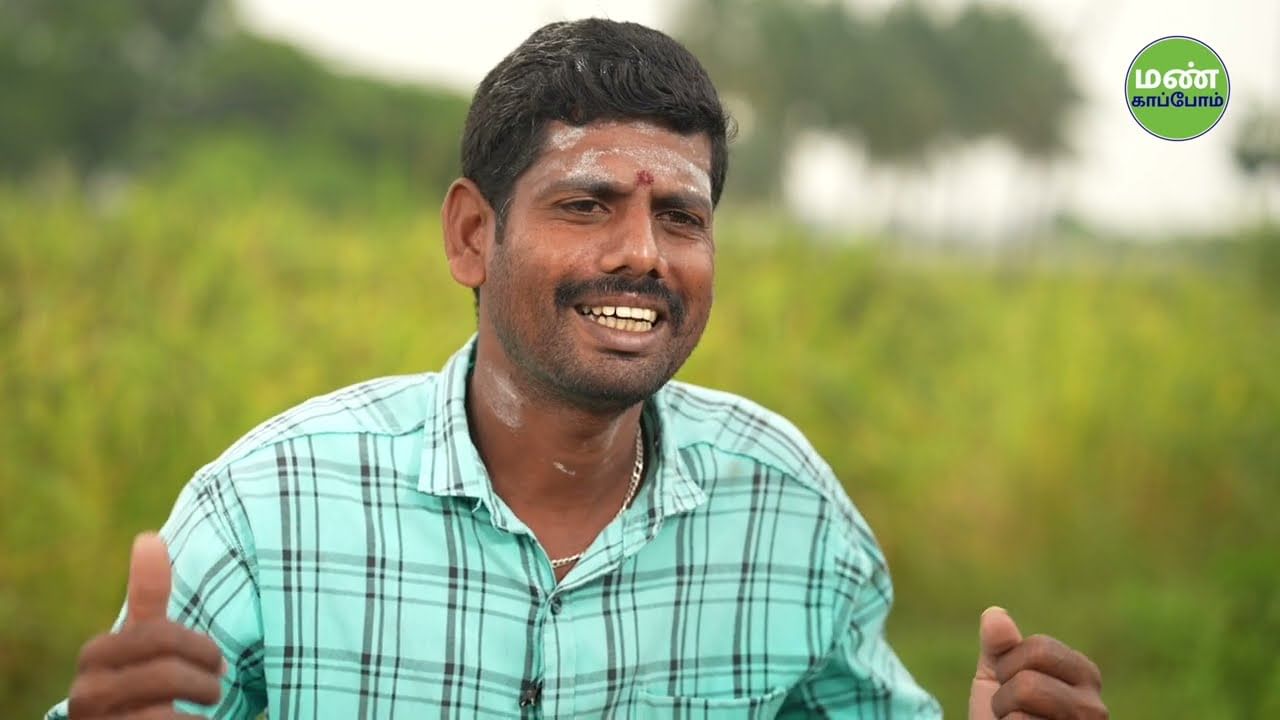>
Save Soil Regenerative Revolution>
Blogs>
Human Impact Stories>
Reviving Soil and Tradition: The Natural Farming Journey of Ragupathi from Tamil Nadu
Share
Reviving Soil and Tradition: The Natural Farming Journey of Ragupathi from Tamil Nadu
Human Impact Stories
14 Aug 2025
12:20 pm
Ragupathi transitioned fully to natural farming, cultivating heritage rice varieties and training 300+ farmers, turning his 8-acre farm into a model of soil and community health.

In the quiet village of Pudur Sangam in Tamil Nadu’s Tiruvannamalai district, a quiet revolution is taking place, led by a determined farmer named Ragupathi. Born into a family with deep roots in agriculture, Ragupathi stepped away from the plough to pursue higher education, dreaming of a different future. But when job opportunities failed to materialize, he returned to his native land and found himself face-to-face with the harsh realities of modern chemical farming. That return marked the beginning of a remarkable transformation, not just for his farm, but for his entire approach to life and land.
At first, Ragupathi followed conventional farming methods, relying on chemical fertilizers and pesticides like many others in the region. However, a series of personal and environmental concerns began to weigh heavily on him. Both his parents were battling chronic conditions such as diabetes and high blood pressure, despite receiving ongoing medical treatment. This prompted Ragupathi to question the food on their plates, particularly the rice sourced from markets, grown through chemically intensive methods. He began tracing the root of their ailments back to the very source of their sustenance: the soil.
In 2017, a small farmer meeting introduced Ragupathi to the principles of natural farming. Motivated by the message, he began a modest experiment, cultivating a traditional rice variety called Thooymalli on just 50 cents of land. His father, a veteran farmer himself, was initially skeptical. But Ragupathi persisted, and the success of his first crop served as a turning point. Over the next few years, he expanded his natural farming practices to all eight acres of his land, completely eliminating the use of synthetic inputs.
Today, Ragupathi cultivates a wide range of traditional rice varieties, including Karuppu Kavuni, Mappillai Samba, Seeraga Samba, Thanga Samba, Nattu Basmati, and more. Each of these varieties carries with it not just unique flavors and nutritional benefits, but also a deep cultural significance. His Karuppu Kavuni rice, once reserved for royalty, is now cherished by health-conscious consumers and even recommended by local doctors. In fact, many government officials and urban professionals in cities like Chennai and Bengaluru now rely on Ragupathi’s naturally grown rice for their daily meals.
Central to his farming system are his native cows, which he refers to as his "fertilizer factory". Their dung and urine form the basis for natural formulations like panchagavya and jeevamrutham, which nourish the soil and protect crops without harming beneficial organisms. During the off-season, Ragupathi grows millets such as kodo, foxtail, and little millet, adding diversity to his farm while further restoring soil health.
The impact of his transformation extends beyond his own fields. With support from agricultural officers like ADA Gopalakrishna, Ragupathi underwent formal training in natural farming techniques. Over time, he has shared his knowledge with more than 300 farmers across the region. While only a handful have fully adopted the practice so far, interest is growing steadily, especially as people begin to see visible results. Ragupathi also uses social media to document his daily farming activities, building transparency and trust with both farmers and consumers.
Seed preservation is another cornerstone of his philosophy. Ragupathi distributes traditional seeds selectively, ensuring that recipients are committed to cultivating them without chemical inputs. This careful stewardship helps preserve the genetic integrity of native varieties and discourages misuse. His work has elevated him to the role of mentor in the community, someone who has not only revived forgotten grains but also restored confidence in time-tested agricultural wisdom.
The benefits of natural farming have been profound. His family’s health has improved noticeably, and the land, once dependent on external inputs, now thrives with internal resilience. Crop yields are consistent, soil fertility is increasing, and market demand continues to grow. Most importantly, Ragupathi has found a sense of purpose and pride in being a farmer who nourishes both people and the planet.
Ragupathi often reminds fellow farmers and visitors that the Green Revolution, while successful in boosting yields, came at the cost of long-term soil health and food quality. He sees natural farming not as a nostalgic return to the past but as a scientifically grounded, economically viable, and ecologically necessary path forward. In his words, “Soil is our friend. If the soil isn’t alive, we can’t live either.”
His journey is a powerful testament to what can happen when one farmer dares to question the status quo. Through persistence, knowledge-sharing, and a deep respect for nature, Ragupathi has not only healed his land but also sowed the seeds of a healthier, more resilient agricultural future.
Keep In Touch
Get the latest updates on blog and happenings at Save Soil Regenerative Revolution and on the rest of Isha's social work — delivered to your inbox.
